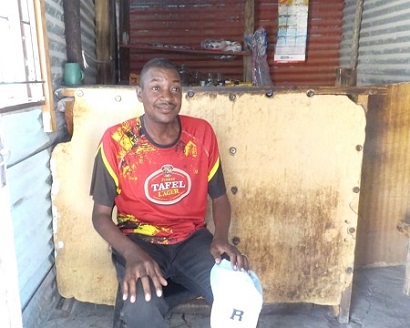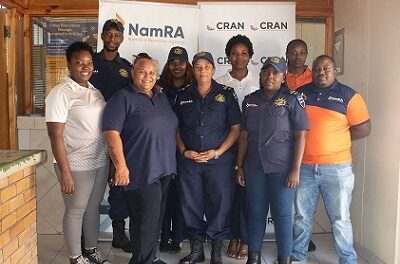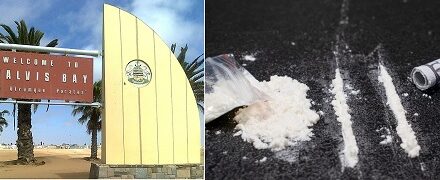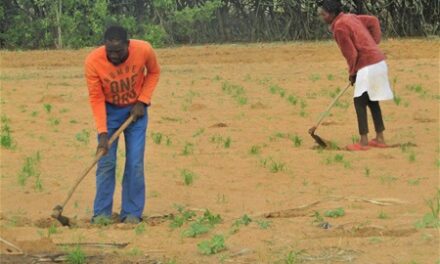By Elina-Ombili Shishaki /
Oniipa is a new and small town, proclaimed as a local authority only in the year 2015. But it is a community with a long and rich history, a history dating back to the 1800s when Finish missionaries settled in the area and built one of the first church buildings in the whole of northern Namibia, and the first hospital.
Today Oniipa is commonly known for its historical architectural buildings like Onandjokwe Hospital and the ELCIN church which, for many locals, are a symbol of historical infrastructure development.
Olumbongo is a shanty town in the town of Oniipa.
Despite the rugged poverty of the settlement, Olumbongo is a place that has been welcoming and accommodating of visitors and people from surrounding villages for over two decades.
In accordance with its nature, the settlement showed its hospitality to the reporter of Omutumwa – locals welcoming the scribe in their homes without asking many questions.
The location is a few meters away from Onandjokwe Hospital. A lot of those who come to Oniipa for hospital purposes do easily find themselves settling and living in Olumbongo.
The town council made efforts by providing electricity and installing public water taps and portable toilets. But in spite of all the commendable development that took place after the proclamation of the town, access to water and adequate sanitation for most residents of Olumbongo still remain the biggest challenges.
Most residents built brick houses on their plots, while the rest still live in corrugated iron shack houses with a minimarket or cucashop (shebeen) on the side.
According to Mr Sakaria Malima, a 52 year-old who is one of the senior residents of this settlement, development is coming. He shares how a bushy area had transformed into a well-developed town in just a few years.
“I was born in Onayena then moved here, and been living here for 26 years now,” he says. “I have witnessed how this town gradually developed. When I came here the area was covered with bushes and shrubs, I then cleaned my area and erected my shack.
“For as long as I stayed here there has been improvement when it comes to provision of water, electricity and toilets.”
“I always wanted to build a house on my plot but due to financial problems I opted to use my hard-earned money to buy a piece of land at Iiyale village to build a village house instead.”
Malima lives with three other occupants in his shack house. Attached to the house is a cucashop that makes him earn a living by selling traditional alcoholic brews known as ‘ginger’ and ‘tombo’, as well as local snacks known as ‘fat cakes’ and ‘kapana’.
“Business is my passion, it is the main reason I moved to this area so I can at least better my life.
“I am a father of 13 children, so I have to take care of all of their needs and ensure that they receive a better education. All thanks to my hard work and dedication some of my kids are now working. However I am still the breadwinner of my house.”
While Malima is satisfied with the income he is making from his business, he expresses that the interest rates on municipal water bills are very high and the profit he makes is not enough to cover all the expenses.
Malima is a member of the development committee of his location and wishes to see more development in his location and for everyone to have a proper house.
Another resident of Olumbongo is Ms Loide Uusiku, who hailed from Uukwiyuushona. She secured a job as a bar lady and has since settled in Olumbongo for 12 years. After she lost her job she used her last cents to start her own cucashop business.
“I used to work as a bar tender, but then I lost my job. So I decided to erect for myself a two bedroom shack house and allocated one room to serve as a cucashop where I sell ‘tombo’, sweets and snacks,” she reveals, adding that she finds it hard to make ends meet and feed her family of two.
“I pay monthly fees to fetch water from my neighbours for both the business and household consumption which is significantly adding up to my monthly expenses,” says Uusiku.
Near the roadside resides Ms Helena Simon, a 43 year-old single mother who was born and bred in Oniipa. In the hope to secure a better future for her children she settled in a rented shack for over ten years.
Simon says that she earns a living by selling traditional liquor known as ‘okatokele’ and also ‘tombo’.
“Since the outbreak of Covid-19 my business has been running losses. I rented this place in the hope of earning a living but now I am stuck between a rock and a hard place,” Simon states.
“This is my only means to earn a living. The profit I make is not enough to cover rent, electricity, water, and school fees for my children and household expenses.”
She further adds that she is struggling to raise money to start with construction of her dream house on her own plot.
“Although I have purchased my own plot in the same location, I am struggling to build a house; I have to stay in this rented shack despite having my own plot because I am burdened with too many responsibilities.”
Mr Johannes Mbango, a 32 year-old unemployed youth, expresses that living in a shack without a job is taking a toll on him as he struggles daily to put bread on the table.
“I used to work as a builder at a construction company some years ago, but my life changed when I lost my job,” Mbango states regretfully.
“I never intended to stay here but now I am stuck here. I pay N$300 for rent monthly which proves costly for me.”
At the time of the visit by Omutumwa, Mbango was busy cleaning and cooking beef trotters at the open market which is a walking distance away from his rented shack.
“It is tough living here; I earn a living by selling beef trotters and fat cakes. I stay in the shack with three other occupants and they all depend on me.
“The money I earn through this hustle is not enough to cater for rent and family necessities and to top it all I have to buy water on a daily basis at a cost of N$3 per 20 litre container.”
He expresses that youth unemployment in Oniipa is very high, which is the biggest problem affecting their daily livelihoods.
“I urge the town council to provide more public taps and toilets to cater for residents in this area who have no income since some have resorted to relieving themselves behind bushes and shrubs when nature calls.”
Efforts to get comment from Oniipa town officials have proven futile. Despite promising to respond to questions by email, no response came forth as the town’s CEO said he has gone on a working trip to Swakopmund.
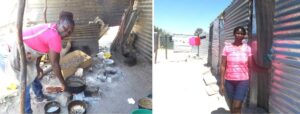
In the photos: Mr Sakaria Malima fights against all odds to make a living for his family of 13 children. Also in another image are residents of Olumbongo struggling on a daily basis to make ends meet.

[NB. This article was produced with the financial support of the European Union. Its contents are the sole responsibility of Omutumwa and do not necessarily reflect the views of the European Union.]

